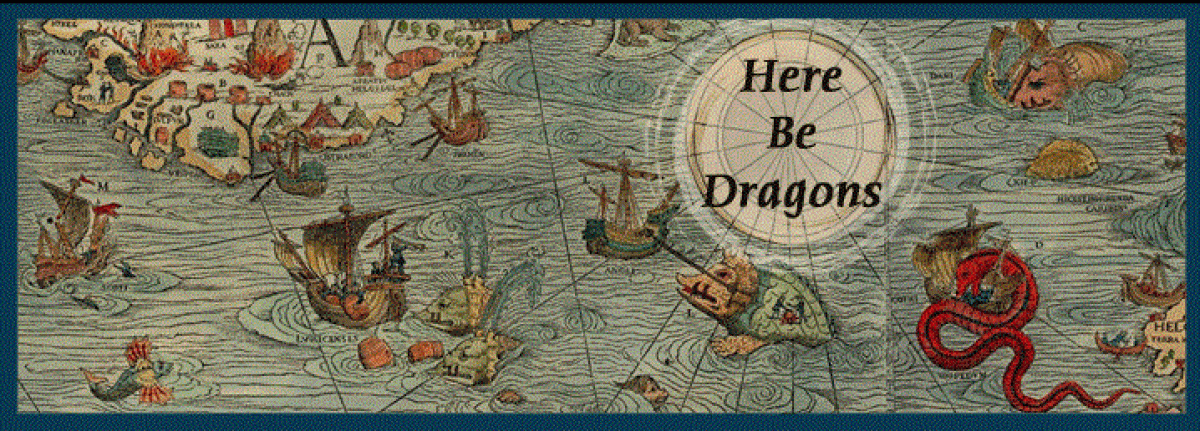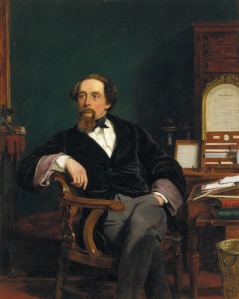I’ve updated an older post in honor of Dickens’ Birthday.
Charles Dickens was born on this day in 1812. Though his work is still highly praised, his personal life is ignored. While we shouldn’t judge a man’s work by his personal life, we must admit biography does sometimes bleed into writing. Let’s look at the complex man who shaped our modern view of Victorian England.
As with many beloved men in history, Dickens had a dark side. He was a very strict father, and left his wife because she had lost all “warmth and tenderness”. Yeah, Chuck, you try being witty and sexy after having 10 children and being left home with them. Dickens left his wife for a young actress who in turn left him when he was too old to be much fun. Karma baby!
I offer you:
“Things may not know about Charles Dickens”
The name “Dickens” was a curse, possibly invented by Shakespeare.
Instead of saying, “What the devil?” as a profanity, people exclaimed, “What the dickens?” The first usage of that word, according to the Oxford English Dictionary, was William Shakespeare’s The Merry Wives of Windsor.
He had first had experience with debtor prisons.
His father was imprisoned for debt and 12-year-old Dickens was sent to work in a boot factory to help support the family. This episode may have formed his worldview and colored everything he accomplished, though he never told the story except obliquely through his fiction. His book Hard Times was thought to be a hardline critique of Victorian society’s view of education and poverty.
He started writing at a young age.
Dickens first published fiction was A Dinner at Poplar Walk, published in Monthly Magazine. He wrote it at the age of 21 while working as a reporter at The Morning Chronicle.
He thought highly of himself but his children? Not so much.
Dickens gave himself a number of different nicknames, including “The Sparkler of Albion”, “Revolver” and “The Inimitable.” He also gave his children nicknames including “Chickenstalker” and “Plorn.”
Dickens kept a pet raven named Grip, which he had stuffed when it died in 1841.
He may have saved multiple lives of friends and strangers after a train crash.
According to the New York Times, Dickens was on a train that derailed over a bridge, in the only first-class carriage that didn’t plummet into a river. He not only found the key that freed his friends, he went to the carriages below and gave water and brandy to those who needed it. Then, the ailing 53-year-old “climbed back into the dangling carriage and retrieved from the pocket of his coat the installment of Our Mutual Friend that he had just completed and was taking to his publishers. The rescue of his fellow passengers and manuscript was kept quiet for many years. Why? Because he was traveling with his mistress the actress Ellen Ternan.
He helped create a home for “fallen women.”
In an era in which women had few options to support themselves and their families, prostitution was a common crime, but one that was severely punished. After an appeal from heiress Angela Coutts, he helped create “Urania House” where former prostitutes could learn to read and write, as well keep house.
Dickens interviewed potential candidates personally after looking in prisons and workhouses for them. He even established the house rules. Approximately 100 women “graduated” from Urania House.
But what was he really hiding?
Dickens had a secret door built in his study which was designed like a bookcase filled with fake books rumored to include titles like Noah’s Arkitecture and a nine-volume set titled Cat’s Lives.
Dickens would have loved Stephen King.
Fascinated by all things paranormal, Dickens belonged to London’s famous Ghost Club, an organization that investigates “ghosts and “hauntings” . His passion for the uncanny began in his teens, when he pored over tales of phantoms, murder and cannibalism.
His last novel, The Mystery of Edwin Drood, remains a mystery.
Dickens had written half of a novel, The Mystery of Edwin Drood, before he died of a stroke in 1870. Edwin Drood was a young man engaged to Rosa Bud, who is also the object of his uncle John Jasper’s affections, as well as Neville Landless, a young man from Ceylon. After he and Rosa break their engagement, Drood disappears.
Dickens left no clues behind as to who killed his protagonist, although many suspect his jealous uncle. There have been multiple radio, television, and theater reworkings of the story, each with different endings.
In 1873, a young Vermont printer, Thomas James, published a version that he claimed had been literally ‘ghost-written’ by him channeling Dickens’ spirit. A sensation was created, with several critics, including Arthur Conan Doyle, a spiritualist himself, praising this version, calling it similar in style to Dickens’ work and for several decades the ‘James version’ of Edwin Drood was common in America.
And now you know!
Just for fun.



Thank you from a Dickens fan (I’ll admit, he grew on me slowly and now I wish there were a few more books) – this was a nice read. I hadn’t heard about the “James Version” of Edwin Drood…must check that out!
LikeLike
Thanks for stopping by to chat with me. Glad you liked the post. I had not heard of the James version until two nights ago. I happened upon a show titled “Monumental Mysteries” . There is a statue of Dickens in Philadelphia that was erected after the Jame’s version became popular; at least according to the Travel Channel’s account.
LikeLike
Thank you for sharing this! You inspired me to find something else I didn’t know about Dickens and I made sure to link to you in that post. 🙂
LikeLike
Reblogged this on Brendan's thoughts and commented:
Since I just launched Dickens’ Oliver Twist for Kids, I thought this blog post was quite appropriate!
LikeLike
Wow. His wife had 10 children???? As a matter of fact isn’t their a recent movie about him?
LikeLike
Is there? I haven’t seen it mentioned anywhere. Would like to see it, if possible
LikeLiked by 1 person
Sarij check this out: http://www.imdb.com/title/tt1700845/
You can rent it on Itunes, Amazon & Netflix too (probably).
Have fun…
LikeLiked by 1 person
Thanks, I’ll check it out. Wish it focused more on his writing life, rather than his later love life.
LikeLike